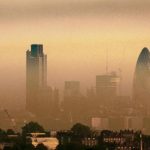 The Covid pandemic has sparked widespread concern that the shift to remote working will have a catastrophic impact upon our cities as people move to quieter, cheaper, and greener environs rather than squeeze into our major cities.
The Covid pandemic has sparked widespread concern that the shift to remote working will have a catastrophic impact upon our cities as people move to quieter, cheaper, and greener environs rather than squeeze into our major cities.
The importance of greener environs is perhaps ably illustrated by a new study from Yale that examines its impact on the migration patterns of Chinese workers. The researchers wanted to understand whether poor air quality would prompt people to move out of cities, where ordinarily they would be most productive.
“Does that mean that pollution imposes some other cost on society that we hadn’t been thinking about?” the authors ponder. “If so, then reducing pollution will have even larger gains than what we had thought.”
Dirty skies
The researchers tracked 18 years worth of pollution and migration data from China and found that people did appear to migrate out of polluted cities, with this trend especially pronounced among educated people.
Those individuals were leaving places with an existing skills shortage and relocating to areas where there was a preponderance of similarly skilled people. This, the researchers argue, diminishes their impact as they could have had a bigger role to play in the places where their skills were scarcer.
The researchers speculate that the impact of this pollution-driven migration is on a par with the impact of pollution on the health of workers. This further increases the benefits societies can achieve by improving air quality as they could potentially be twice as large as we previously thought.
Urban mobility
The findings partially help to explain something that has long puzzled economists, as within any country there are inevitably regions with higher productivity and subsequently higher wages. Logic would suggest that people would move from less productive areas to these more productive cities, thus evening wages across the country.
This doesn’t tend to happen, however, with people instead staying in places where they’re not particularly productive. This could be because moving is a hassle. It could be because entering a new job market might carry risks. The researchers believe their findings also highlight the role air quality might play, as people may not wish to move to a polluted area.
What is perhaps most interesting is that it is the educated people who tend to move, with the researchers arguing that not only do they care more about pollution, but their extra wealth gives them a greater opportunity to move. This is especially so in China as the country’s hukou policy limits the number of public services people can get when they first move to a new city.
“It is no surprise that many Chinese companies and multi-nationals now offer ‘pollution hardship allowances’ or ‘pollution wage premiums’ to encourage employees to take up positions in economically attractive markets like Beijing,” the researchers explain.